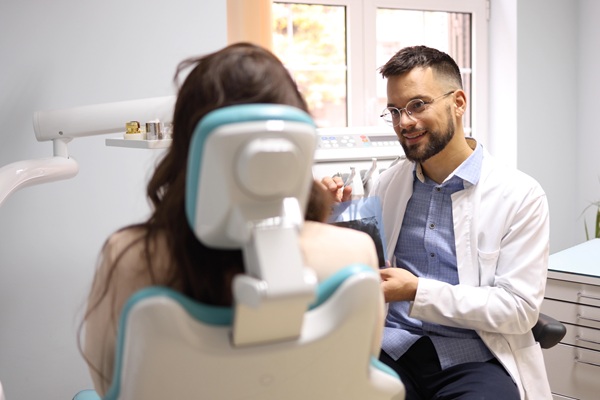 You may require emergency dentistry services if you experience severe discomfort, severe bleeding, tooth damage, swollen gums, or extreme tooth sensitivity. If one or more of these symptoms exist, you should contact a local dentist offering emergency services to find the appropriate action to take.
You may require emergency dentistry services if you experience severe discomfort, severe bleeding, tooth damage, swollen gums, or extreme tooth sensitivity. If one or more of these symptoms exist, you should contact a local dentist offering emergency services to find the appropriate action to take.
What Signs Indicate a Need for Emergency Dentistry Services?
The following reviews the most common signs that indicate a dental emergency, and the patient should seek emergency dental services.
Severe discomfort
Severe mouth discomfort is always a concern. Whether the pain is from oral trauma (i.e., a blow to the face), an infection in the mouth, or another cause, a prompt visit to the emergency dentist is most likely in order if the pain becomes intolerable or exists along with other oral health concerns. If left untreated, the discomfort is likely only to worsen, which could increase the risk of developing other oral health concerns.
Severe bleeding
Severe bleeding that results from a blow to the mouth could increase the risk of other concerns such as an infection, gum complications, and the loss of teeth. If the injury is not life-threatening and there is not a substantial amount of blood loss, then an emergency dentist may be able to help. However, severe bleeding that results from a potentially life-threatening concern (i.e., a serious mouth injury that results from a car accident) requires a trip to the emergency room.
A damaged tooth (knocked out or knocked loose)
A knocked-out tooth is a sign of a dental emergency as well. A tooth that is knocked loose could also be a sign of dental trouble, especially if there are other symptoms such as severe swelling and discomfort. For example, suppose something knocks a tooth out of the mouth. In that case, the emergency dentist may be able to reposition the tooth in the socket and prevent the need for tooth replacement if the patient visits right away and properly preserves the tooth.
Swollen gums
Swollen gums could be an indicator of several different oral health concerns. Notably, it could indicate that the patient has an oral infection. An oral infection, and specifically a tooth infection, could be a serious and immediate concern as the infection has the potential to spread to other areas of the mouth and body. In addition, an untreated tooth infection could lead to the loss of the tooth and a dental abscess, which could require more invasive treatment to address.
Extreme tooth sensitivity
Tooth sensitivity is a sign of severe tooth decay, gum complications, or tooth infection. Therefore, it is important to visit the dentist urgently to ensure the issue does not worsen, linger, or lead to more serious oral health concerns.
Find out more and schedule a visit today
Are you dealing with symptoms that could indicate a dental emergency? If so, call our dental practice today and let us know your symptoms. We can help you determine if your symptoms are an emergency and if an immediate visit to our practice is necessary.
Request an appointment or call Ohio Cosmetic Dentists at 614-503-5240 for an appointment in our Columbus office.
Recent Posts
Emergency dentistry can tell you a lot about tooth pain. They can tell you what the cause is, how to treat it, and what to do to prevent it in the future. Tooth pain is typically a sign there is something wrong with a tooth. The pain typically lingers until the root cause of it…
Gum bleeding signifies that you must visit the emergency dentistry office immediately. The dentist will examine your mouth to determine if the bleeding is due to simple irritation or a more severe condition. If your gums are bleeding, you must see a doctor immediately so the problem does not worsen. This article explains why anybody…
Seeking an emergency dentistry solution to tooth avulsion must happen right away. In this type of dental emergency, your chances of getting your tooth back in your mouth are higher if you go to the urgent dental care clinic. Knowing how this dental facility can help your situation can give you hope for recovering your…


